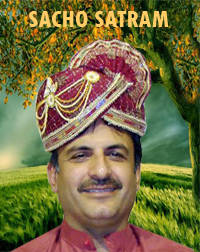In one of his profoundly heart touching satsangs, Hazir Swaroop Sai Sadhram Saheb lovingly shared how we can nurture and strengthen the roots of our children so that they remain balanced amid the inevitable ups and downs of life. To help them maintain inner stability in all circumstances, it is essential to nourish their foundation with the water and fertilizer of good values and noble virtues.
Just as we say, “One and one make eleven” or “There is strength in unity,” similarly, a focused and disciplined mind becomes immensely powerful. With the light of a strong and enlightened mind, we can remain aware, conscious, and capable of fulfilling our responsibilities successfully.
Hazir Swaroop Sai Sadhram Saheb emphasized that to build a strong foundation in our children, our words and behavior must be thoughtful and sincere. Children do not only learn from what we tell them—they learn even more by observing how we live.
“What you say, they will hear. What you do, they will observe.”
Our influence over our children is strongest during their early years, generally until the age of eleven. During this time, they walk in our footsteps. But as they grow older and begin to engage more with the outside world, they become increasingly influenced by others. This makes it essential to spend quality time with them when they are young. During these precious years, we must instill right education and values—not just through words, but by embodying those values ourselves.
If we teach our children to speak the truth, we must also be truthful. If we ask them to be kind and respectful, we must reflect the same qualities in our interactions—with family, friends, neighbors, employees, and everyone else. Children absorb our conduct and speech deeply, even when we think they are not paying attention.
Children observe everything: how we handle money, how we speak to elders, how we maintain honesty in our dealings. These subtle lessons shape their character more than any formal education.
Just like soft clay can be molded into any shape, a child too can be shaped during their tender years. Once the clay hardens, it becomes difficult to change. Similarly, once a child grows older, transforming them becomes a significant challenge.
Whenever your child asks for your time, put everything else aside and give it to them wholeheartedly. These are not moments to miss—this is the sacred window in which their future is being shaped. This is the time to build their inner foundation with love, guidance, and values that will stay with them for life.
Hazir Swaroop Sai Sadhram Saheb repeatedly reminded us that the age of eleven is a turning point. After this age, reform becomes difficult. Therefore, remain alert and consistent. Whatever you wish to teach your child, make sure you first live it yourself.
Saijan also explained why we celebrate the birth and death anniversaries of great Sants. These days are not mere rituals, they are meaningful reminders of how these divine souls lived, what they achieved, and how their names became immortal through their disciplined lives and deep sadhnas. By remembering their journeys, we are inspired to imbibe those same values and uplift our own lives.
To truly learn from the greatness of the Sants, we must observe how they lived, with humility, patience, and unwavering integrity, even in the face of difficulties and without modern comforts. In those times, parents still managed to instill true knowledge and values in their children.
Hazir Swaroop Sai Sadhram Saheb narrated a touching example of Sant Sai Kanwarram Saheb, who met Shahanshah Satguru Sai Satramdas Saheb at the tender age of just six or seven. When asked a question by the Satguru, his reply, so full of wisdom and humility, astonished everyone. This depth and awareness came from the early guidance and teachings he received from his parents. Even at that young age, he had developed a deep sense of respect, discernment, and spiritual understanding.
Children possess an incredible ability to grasp and learn. While we struggle to pick up new languages in adulthood, children, if exposed early, learn and speak fluently. Their observation is sharp. They learn not only what to say, but how to say it, depending on who they are speaking to, elders, peers, or others. Sant Kanwarram Saheb knew the difference between speaking to the ordinary and addressing a divine master. That is why he made a unique offering—dried peas—not to everyone, but only to Shahanshah Satguru, asking not for money, but for the blessing of being accepted as a disciple. This clarity, wisdom, and humility were instilled in him by his parents from a very young age.
All moral values and innate qualities, truthfulness, humility, respect, are passed down by parents. But this transfer is only possible in the early years. After the age of eleven, it becomes very difficult to change a child’s thinking or behavior.
Saijan expressed deep concern about modern parenting, where many parents no longer spend meaningful time with their children. To avoid giving time, they hand over money or mobile phones—leading children to get distracted, addicted, or misled by inappropriate content. Later, when children go astray, we blame them. But the real cause often lies in our own actions—or inactions. Our own lifestyles were flawed, and our children simply followed our example.
So before blaming the children for their bad habits or poor choices, we must look within and ask: Were we truly there for them when they needed us the most?
Hazir Swaroop Sai Sadhram Saheb beautifully concludes that if we wish to avoid regret in the future and be truly grateful to God, we must take care of our children today. We must offer them our time, our wisdom, our presence. We must raise them not only as capable individuals but as good human beings grounded in moral and spiritual values.



